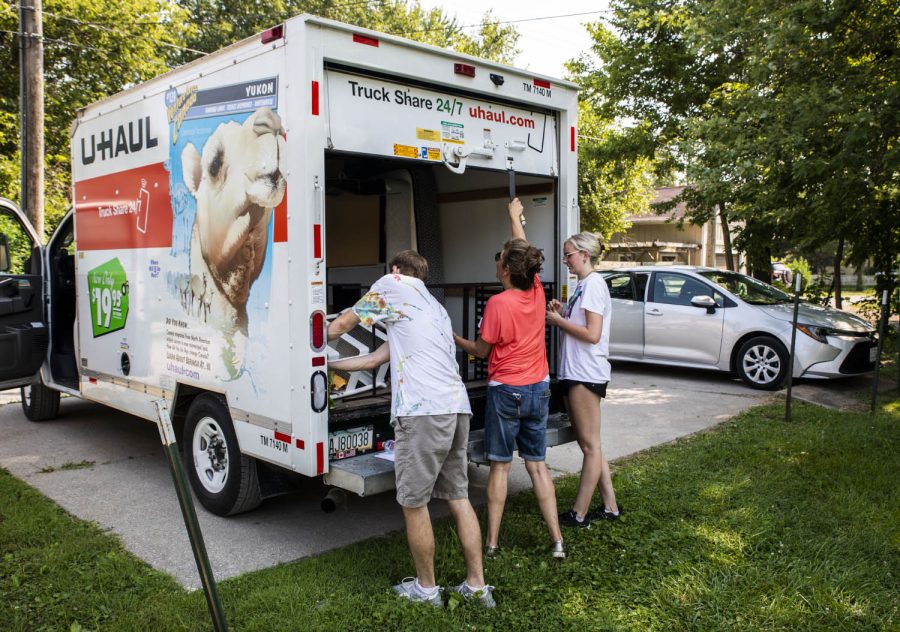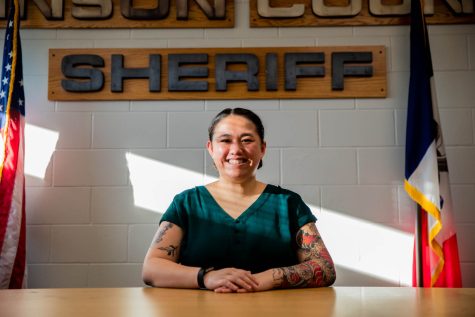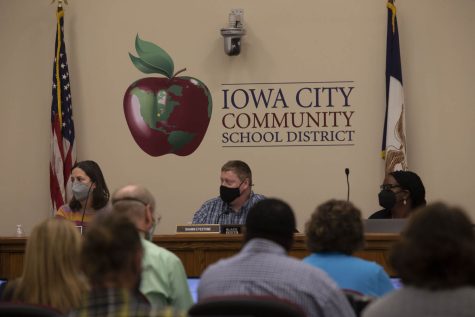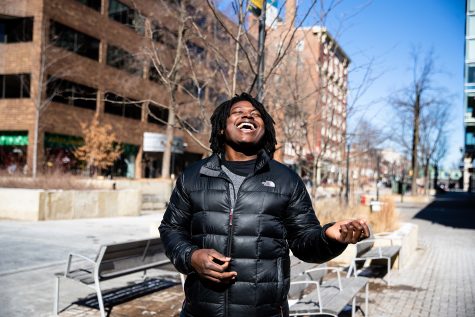USG providing education, resources for Iowa City lease gaps
University of Iowa USG is working to provide students with additional resources during the gaps between their leases.
Will Meyer, left, and Kacie Frederick check the load of the U-Haul on Monday, July 26, 2021. Frederick said she had to move out of her old apartment but cannot get into her new one for 3 days, so they have to leave her things in the U-Haul.
March 1, 2022
Joshua Benjamin felt overwhelmingly embarrassed over the summer, when he found out he would have to find a place to live for nearly a month.
Benjamin, who was a fourth-year student at the University of Iowa until leaving school to pursue stand-up comedy, said his lease ended during the last week of July. He didn’t realize how wide the gap was until he signed his next lease just weeks before he was scheduled to move out.
Ultimately, he packed his stuff into a friend’s apartment while she was in her hometown.
“She let me stay in her empty apartment during that time, otherwise I don’t know what I would have done,” Benjamin said. “I basically moved all of my stuff from my apartment into her place and it was very crowded for a while before I finally moved everything to Hawk’s Ridge.”
UI Undergraduate Student Government is working with the Iowa City City Council to address lease gap week for students, as the week between leases can mean students forced out of their current living situations have nowhere else to go.
The lease gap week is the one to four weeks where students who live off-campus are stuck in between their leases and forced to find a place to stay in the meantime.
Benjamin said he understands that the gap exists to allow landlords to clean and prepare apartments and homes for the next tenants, but believes there should be more resources to help students through lease gap weeks.
“I think that there should be resources where students can leave their stuff,” Benjamin said. “I know, during that week, so much furniture is being left out on the street because you have no place to put it.”
Benjamin, who is originally from Ames, Iowa, said he was against packing up all his belongings and returning home.
“I guess I could have, but I liked being in Iowa City,” Benjamin said. “I don’t want to be kicked out of a city I’m paying to live in just because the leases don’t match up. That especially would apply for people who don’t live in state. They’re just forced out for a week or more, in my case.”
Anna Van Heukelom, one of two city liaisons for USG, said the issue of a lease gap week is important to address because it is something that many students experience, but few realize how significantly it may impact them.
One idea is for the UI to provide housing for students during their lease gap, Van Heukelom said.
Van Heukelom said, prior to the pandemic, the university provided dorm housing during lease gap weeks. The UI could not commit to housing students in summer 2022 because of staffing shortages, they said, and this has caused a shift in USG’s strategy.
“Ellie [Miglin] and I have recently thought about other ways we can advocate for this issue, so we’re going for education now,” Van Heukelom said. “Even if we can’t give [students] any resources this year, just letting people know to prepare for it.”
With help of the city council, the USG city liaisons put together a magnet to be distributed to make students aware of general leasing issues.
USG and City Council are splitting the costs of the 11,000 magnets for UI students. Van Heukelom said they will be distributed in the coming weeks.
Van Heukelom said that, in their efforts, they try to stay away from the phrase “homeless week,” which is how students often refer to the lease gap week.
“It can be inconsiderate of people who are dealing with long-term homelessness,” Van Heukelom said. “It’s just what students call it.”
Van Heukelom and their co-city liaison, Ellie Miglin, curated a survey that was sent out to students about the lease gap week to better understand the issues that needed to be addressed.
Out of 267 respondents, 89 percent said they feel there are inadequate resources to address the lease gap week. Of individuals who experience a lease gap, 85 percent rated their street level at a four or five out of five during their gap.
“Say you live out of state, and you don’t have family or friends in the area who could take you in and take your stuff in and give you space, food, and shelter,” Miglin said. “That is a really major financial and emotional burden that you might have to go through.”
In the future, Miglin said USG efforts will focus on providing students with a place to stay on campus for free during their lease gaps. Previously, the UI charged $35 per night, which meant that for students like Benjamin, the total cost could have been more than $800.
Miglin said these issues are important to address because they affect so many people. One story from the USG survey described a student living in a trailer that her parents had brought down. Quickly, issues arose between the family and their partner.
“It gets so complicated because people are nuanced and they have lives,” Miglin said. “If we don’t provide adequate resources, it makes it harder for everyone.”





















